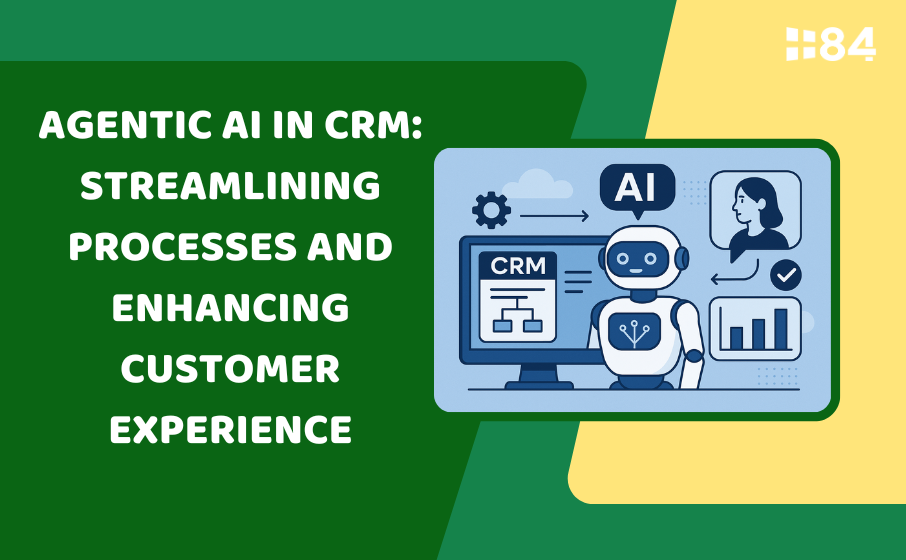As businesses increasingly rely on technology to manage customer relationships, Agentic AI is emerging as an advanced solution for automating and optimizing CRM workflows. Far more than just a support system, Agentic AI has the capability to process data, make decisions, and take intelligent actions, enabling companies to operate more efficiently and improve customer satisfaction.
But how exactly does Agentic AI transform CRM processes? How can organizations implement this technology from strategy to execution? This article explores how Agentic AI works within CRM systems and outlines its benefits, helping businesses unlock its full potential.
Agentic AI and the Transformation of CRM
Agentic AI is revolutionizing CRM by reshaping the way businesses interact with and serve their customers. This transformation is evident in three core areas: task automation, advanced data analytics, and personalized customer experiences.
1. Task Automation in CRM
One of the greatest advantages of Agentic AI is its ability to automate repetitive tasks in CRM systems. This not only relieves employees of manual workloads but also significantly boosts operational efficiency. Specifically, Agentic AI can:
- Automatically gather and categorize leads based on user interactions, allowing businesses to quickly identify and reach high-conversion prospects.
- Send personalized customer care emails that foster stronger engagement and build trust.
- Prompt sales teams with follow-up reminders for potential opportunities, ensuring no leads fall through the cracks.
Example: If a customer consistently opens emails about a specific product but hasn’t made a purchase, Agentic AI can automatically send a targeted offer or notify a sales rep to follow up, increasing the chances of conversion.
2. Advanced Data Analytics
Beyond automation, Agentic AI is equipped with powerful data analytics capabilities that give businesses deeper insights into customer behavior and needs. This enables companies to:
- Forecast buying trends based on historical data, aiding in proactive production and sales planning.
- Identify high-potential customer segments for more effective targeting.
- Recommend personalized engagement strategies to boost response rates and optimize marketing campaigns.
Example: A CRM system integrated with Agentic AI may recognize that Customer A typically makes purchases at the beginning of each month. It can then automatically send a promotional offer just before that period to trigger buying intent.
3. Personalizing the Customer Experience
In an era where customer experience (CX) is paramount, Agentic AI enables deeper personalization across all touchpoints by:
- Recommending products and services that match individual preferences, creating a unique and satisfying shopping journey.
- Tailoring marketing content to customer behavior and interests, ensuring more relevant and compelling messaging.
- Delivering instant support via intelligent AI chatbots, helping customers resolve issues quickly and conveniently.
Real-World Example: Vinmec and VinBase Chatbot
Vinmec, one of Vietnam’s leading healthcare systems, has pioneered the use of AI in customer service through a 24/7 support chatbot. Previously, customer service was limited to business hours and relied on human agents. The introduction of the chatbot expanded support availability and significantly improved service quality by offering faster and more accurate assistance.

VinBase Chatbot in Customer Service
The VinBase Chatbot is integrated across multiple platforms including Facebook, the Vinmec website, and the OneVinmec mobile app, allowing customers to easily access information and services. It is designed to handle a wide range of inquiries, including:
- Hospital information: Provides details about facilities, specialties, and available services.
- Pricing: Shares information on consultation, treatment packages, and other services.
- Service recommendations: Suggests health packages tailored to individual customer needs.
- Appointment scheduling: Assists customers in booking consultations with desired doctors or specialists.
- Complaints and feedback: Collects customer feedback and provides timely resolutions.
This integration ensures a consistent, high-quality customer experience at every touchpoint, reflecting Vinmec’s professionalism and commitment to service excellence.
Results and Benefits
The chatbot implementation has enabled Vinmec to not only reduce the workload of its customer service staff but also enhance customer satisfaction, increase loyalty, and strengthen its professional brand image:
- Over 70 operational scenarios implemented: Ensuring the chatbot can handle a diverse range of customer needs.
- Response time under 0.5 seconds: Ensuring prompt replies and a seamless user experience.
- 24/7 support: Enabling customers to access services anytime, without time constraints.
Practical Applications of Agentic AI in CRM
Agentic AI isn’t just a theoretical concept—it brings powerful real-world applications to CRM, helping businesses streamline operations and deliver superior customer experiences.
1. Chatbots and Virtual Assistants
Agentic AI enables the development of chatbots and virtual assistants that can engage in natural, dynamic conversations with customers. Unlike rigid, scripted bots, these AI-powered systems understand context, handle complex requests, and provide appropriate solutions. Key benefits include:
- 24/7 support: Customers receive immediate assistance at any time without waiting for a live agent.
- Fast issue resolution: Simple problems are resolved quickly, saving customers valuable time.
- Automated task handling: Bots can schedule appointments, send notifications, or collect feedback, freeing up staff for more strategic work.
Example: If a customer wants to check their order status, the chatbot can retrieve the information directly from the system and provide an instant update—no need for a call center transfer.
2. Predictive Customer Behavior
Agentic AI can analyze historical data and customer behavior patterns to predict future purchasing behavior. This empowers businesses to:
- Identify churn risks: Detect customers showing signs of disengagement and trigger timely retention strategies.
- Optimize timing: Determine the best moments to engage with customers for maximum impact.
- Forecast revenue: Support revenue predictions and campaign planning based on analyzed trends.
Example: If AI detects that a customer is less active, the system can automatically send a special offer or personalized message to re-engage them.
3. Automating Sales and Marketing Workflows
Agentic AI helps optimize end-to-end sales and marketing processes, from lead qualification to post-sale engagement:
- Lead scoring and segmentation: AI classifies leads based on interest and behavior, allowing sales teams to prioritize high-conversion prospects.
- Automated follow-ups: Sends emails, messages, or reminders to nurture leads and convert them into customers.
- Optimized content delivery: AI suggests the best marketing content for each audience segment across channels like email, SMS, or ads.
Example: When a prospect downloads a product brochure, the CRM system can automatically send a thank-you email and schedule a follow-up call with a sales representative.
Benefits of Integrating Agentic AI into CRM
Agentic AI is more than just advanced technology—it’s a powerful ally that brings tangible benefits to businesses, especially in optimizing CRM processes.
- Significant productivity gains: By automating repetitive tasks like email marketing, lead segmentation, and interaction tracking, Agentic AI frees up employees to focus on strategic and creative work. This boosts productivity and empowers staff to maximize their potential.
- Improved accuracy and consistency: With its ability to process large volumes of data and perform tasks autonomously, Agentic AI minimizes human error—especially vital in CRM processes where precision and consistency are key to customer satisfaction.
- Exceptional customer experience: By “reading” customer needs and behaviors, Agentic AI enables businesses to deliver fast, accurate, and highly personalized service. Whether answering inquiries, suggesting relevant products, or handling support tickets, Agentic AI creates seamless, memorable experiences that foster loyalty and satisfaction.
Challenges and Solutions in Deploying Agentic AI in CRM
While the benefits of Agentic AI in CRM are clear, implementation can come with challenges. To overcome them, businesses need thoughtful strategies and practical solutions.
1. Cost and Resource Constraints
Challenge: Implementing Agentic AI requires significant investment in both technology and skilled personnel—often a burden for small and mid-sized businesses.
Solutions:
- Start with simple, easy-to-deploy AI models and scale gradually.
- Choose flexible AI vendors that offer customizable, modular solutions aligned with business growth.
- Leverage existing internal resources, such as IT staff, to reduce outsourcing costs.
2. Workforce Training
Challenge: Employees need to understand how to work with AI systems to fully leverage their benefits, which demands investment in training.
Solutions:
- Organize in-depth training programs on Agentic AI and intelligent CRM systems.
- Foster a learning culture that encourages experimentation with new technologies.
- Provide clear, accessible documentation to guide employees in using AI tools effectively.
3. Data Privacy and Security
Challenge: Using Agentic AI to collect and process customer data raises concerns about privacy and compliance.
Solutions:
- Implement robust data encryption to prevent unauthorized access.
- Enforce strict access control measures, ensuring only authorized personnel handle sensitive data.
- Regularly audit and update security protocols to counter emerging threats.
- Comply with data protection regulations such as GDPR or local equivalents in Vietnam.
By proactively addressing these challenges, businesses can successfully implement Agentic AI and fully harness its potential to strengthen CRM and deepen customer relationships.
Conclusion
Agentic AI is not just a technological advancement—it’s a strategic asset that helps businesses streamline operations, elevate customer experience, and boost overall performance. However, to fully realize its potential, organizations must adopt a comprehensive approach that includes smart technology investment, workforce enablement, and effective data governance. As AI continues to evolve, integrating Agentic AI into CRM is no longer just a trend—it’s becoming a critical component for sustainable growth and competitive advantage in the digital era.


